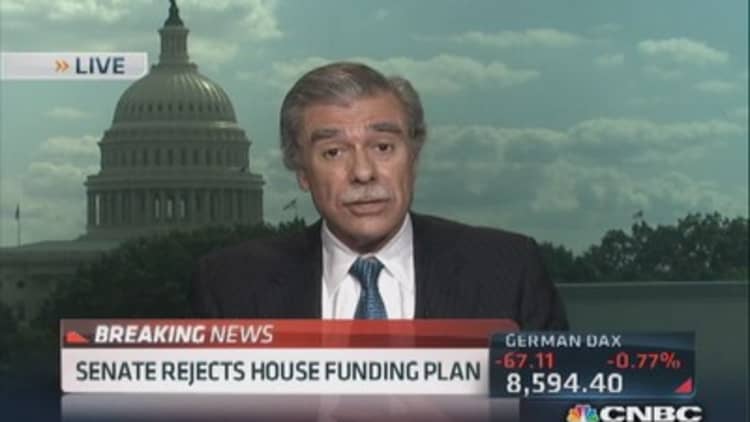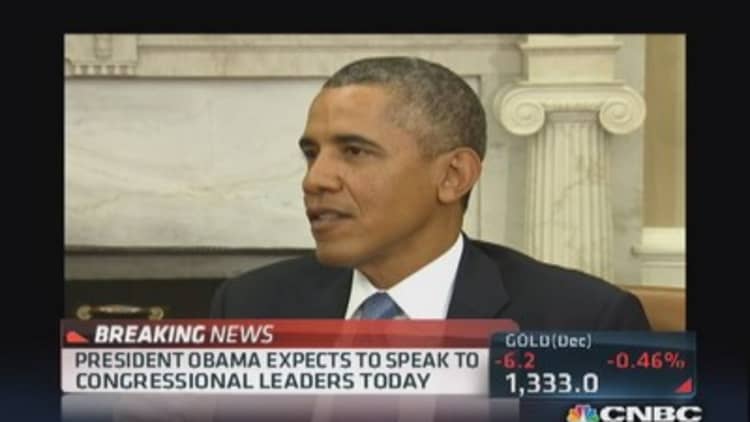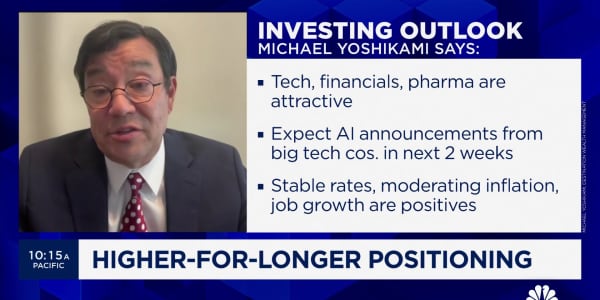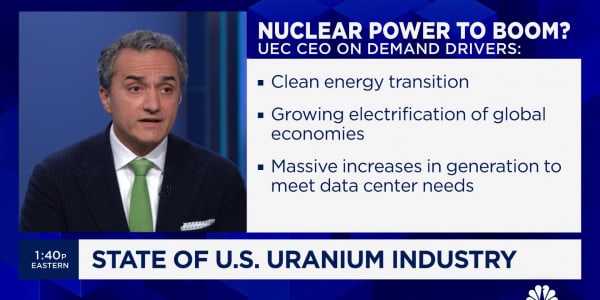Regardless of whether the U.S. government shuts down non-essential services at midnight, we're likely to face another type of budget crisis in just a few weeks—the confrontation over the debt ceiling.
House Republicans have said that they will not agree to lift the debt ceiling unless the White House compromises with them on the implementation of President Barack Obama's healthcare law.
The White House and Senate Majority Leader Harry Reid have said they won't negotiate over the debt ceiling.
We actually hit the debt ceiling earlier this year.
The government is no longer accumulating additional external debt. It has been able to fund its ongoing spending obligations through "extraordinary" measures. Treasury Secretary Jack Lew, however, has said that the government's flexibility to continue to fund itself without additional debt will end around Oct. 17.
One of the big fears is that hitting the hard stop could mean that the U.S. government would be forced to default on debt payments. The president has warned of this consequence by saying the Congress threat not to lift the debt ceiling puts the creditworthiness of the U.S. at risk.
This, however, is an oversimplification.
There are many alternatives to missing debt payments, most of which are within the control of the president. If we do default on the debt, it will mean that the president himself chose to take this path. No one can force it upon him.

(Read more: Obama: I'm 'not at all' resigned to a shutdown)
Without a doubt, if we hit Oct. 17 without a deal to raise the debt ceiling, the president will be in a very difficult position.
Both statutory law and the Constitution prohibit the president from incurring debt without congressional authorization. Other budgetary laws and the Constitution prohibit the president from refusing to spend funds authorized by Congress. In addition, he's barred by the Constitution from raising taxes without Congress's authorization.
Which means that the president will be in a position of having to choose which laws and constitutional provisions he will violate. There doesn't seem to be any way around this terrible choice.
Some legal scholars have proposed that the 14th Amendment requires the president to take action to avoid a default on the outstanding debt of the United States.
The president could do this either by prioritizing the payment of debt over other spending—although the Obama administration has said in the past that it lacks the legal and technological ability to do this—or by raising the funds to make debt payments through unauthorized taxes or unauthorized debt issuances.
(Read more: Here comes the DC shutdown: What you need to know)
There's reason to be skeptical about the claim that the administration cannot prioritize debt payments.
We know that the government has plans in place to fund only certain programs—those deemed essential—in the case of a government shutdown. As Yale's Jack Balk points out, surely such a thing can be done in the case of a debt ceiling impact. Even if the software didn't exist at Treasury to prioritize payments the last time we had a close call with the debt ceiling, shouldn't it have been developed by now?
There's even more reason to be skeptical about the claim that the 14th Amendment requires the president to fund payments on the debt as they come due. The relevant provision of the 14th Amendment is the first sentence of section 4, which reads:
The validity of the public debt of the United States, authorized by law, including debts incurred for payment of pensions and bounties for services in suppressing insurrection or rebellion, shall not be questioned.
Notice that there's nothing there mandating timely payments of debt as they come due.

Even if the Obama administration can prioritize, it may be unwilling to do so. And even if the 14th Amendment doesn't prohibit the government becoming delinquent on its debt, the Obama administration may—very sensibly—decide that defaulting would be a very imprudent thing for it to do.
One alternative would be for the president to unilaterally raise taxes. If the president were to confiscate the wealth of Americans on his own, he would be able to make any payments when due. This would be unconstitutional and illegal, of course, but all the available choices suffer this deficiency.
(Read more: Will 11th hour bill keep the lights on temporarily?)
What would make this especially problematic, however, is that the president would only be able to raise taxes from those willing to pay higher taxes. Any person who refused to pay the taxes would have to be brought to court and sued for failure to pay.
This leaves us with the alternative of the president unilaterally ignoring the debt ceiling and issuing new debt.
Congress isn't powerless to stand athwart a president who issues debt unilaterally, but case history has shown the Supreme Court would be unwilling to do the job of reining in the president.
Instead, Congress could impeach the president if Republican lawmakers felt strongly enough about the issue. But this seems unlikely. And, in any case, the Democrat-controlled Senate would certainly refuse to convict.
(Read more: Market has more to worry about than the shutdown)
In a situation where the president has embarked on the path of unilateral debt issuance, we'd likely see a "flight to safety." In the first place, this would be a flight into pre-ceiling, fully authorized Treasurys.
What's more the president would have signaled a willingness to make good on the debt despite the ceiling—which means that the default or delinquency risk would have been removed. These factors would put downward pressure on the yields of ordinary Treasurys.
If the "Obama bonds," as they might be called, traded at a premium to ordinary Treasurys, they might still have lower yields that ordinary Treasurys do today. That is, the downward pressure of ordinary Treasury yields would drag down the yields on the Obama bonds.
This would be especially true if the Obama bonds were extremely short-term debt so that investors would be confident that they would soon be receiving cash in exchange for their bonds.
In other words, there's nothing stopping the president from issuing bonds not authorized by Congress. If the president refuses to do so, it means he's prioritized respecting the debt ceiling over concerns about defaulting on the debt.
—Follow John Carney on Twitter @carney.






